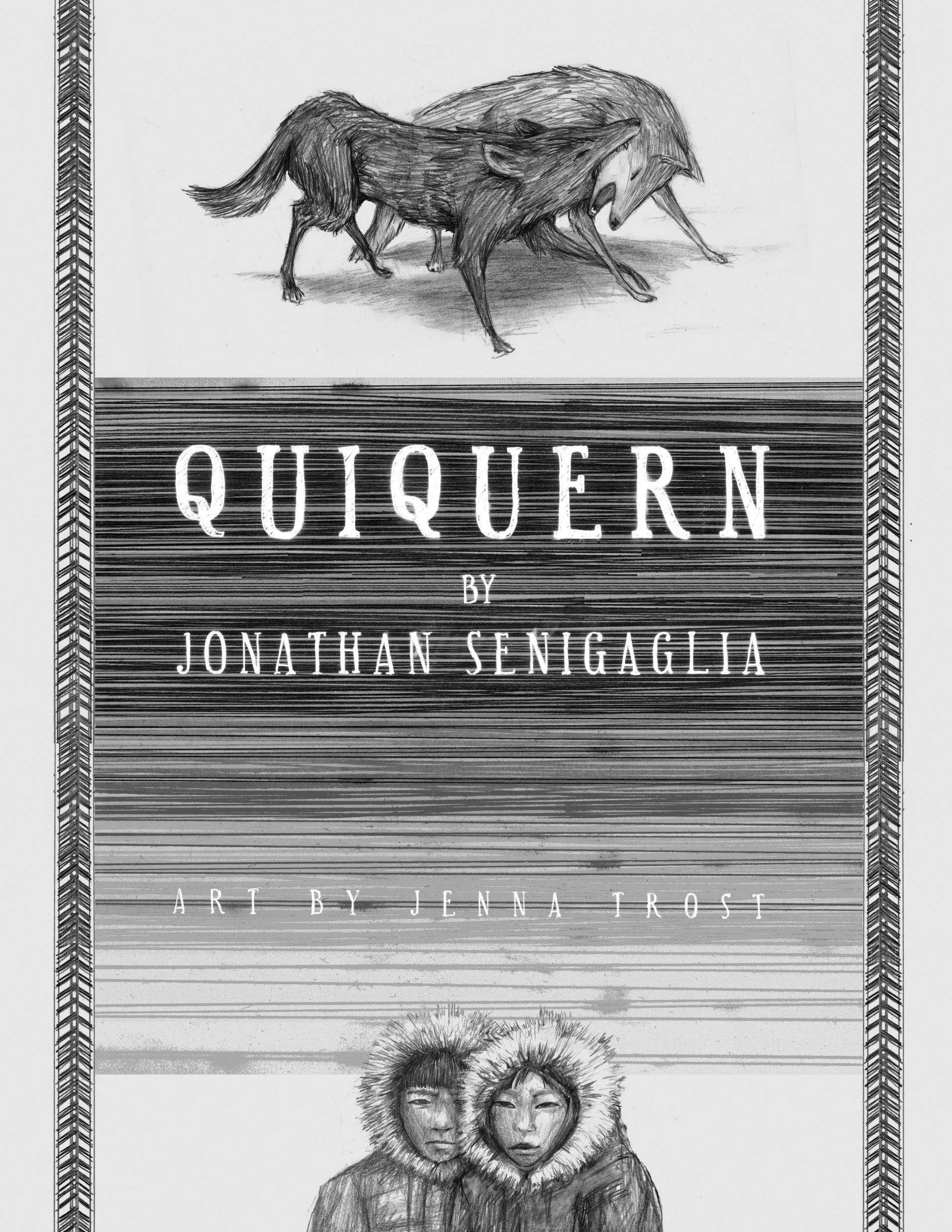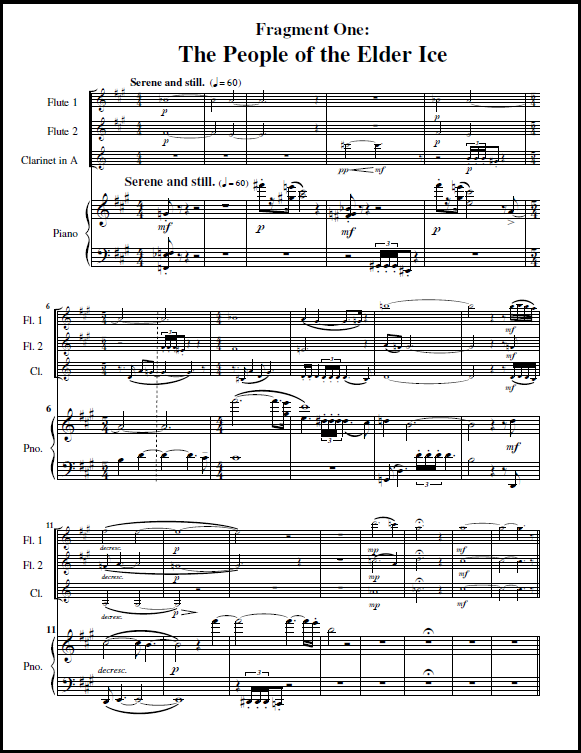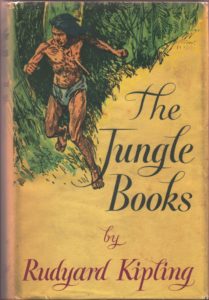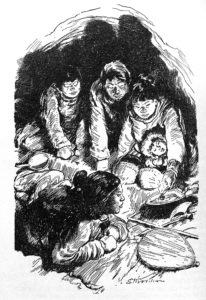This bar, a crucial landmark of the far west, shines like a proud beacon in the foggy, grey, windswept outer reaches of the Sunset district. It’s the perfect place to seek shelter from the ocean breeze and enjoy one of the chillest open mics in the universe. They even have a piano. The Riptide has since burned down and been rebuilt from the ashes, like a f*cking phoenix, and it’s still just as grand as ever! On the night I first heard about the Songwriting Club, I was alone at the bar, sipping a beer and reflecting on life, asking the universe for inspiration. When I learned a bit more about this new creative endeavor, something inside me clicked.

Here’s the gist: write one new song a week, based on a title assigned by the creator of the club (a local musician and concert promoter named KC Turner). Each week a new title and new song. Only rule: don’t miss the deadline. It wasn’t a competition, just a personal challenge. By the end of the week, a video of the new song must be posted on the Songwriting Club’s Facebook page for all the world to see. The first title was “Find Your Own Railroad”. Ready, set, go.
I’m not sure why this particular challenge burrowed so deeply into my head, but for whatever reason I went home that evening with an agenda: I had to write that song by the end of the week. I started thinking about that title and what it could mean, and a story began to take shape in my brain. An alcoholic father encounters his alcoholic son at a saloon after many years apart. The son realizes he has become just like his father, and pleads with the old man to come away with him over the hills. Together they can reform their lives, put down the bottle for good, rebuild their tattered relationship.
The jaded old man tells his son that that’s an impossible dream, wishful thinking. He’s going to do what he’s always done – drink until he passes out in the street – and his son had better go find his own destiny: “Find your own railroad, don’t get off until the track runs out. And if you ever come back to find your old man, you better look six feet beneath the ground.”
Here is the first performance of the song at the Hotel Utah Saloon open mic, with Erica singing harmony:
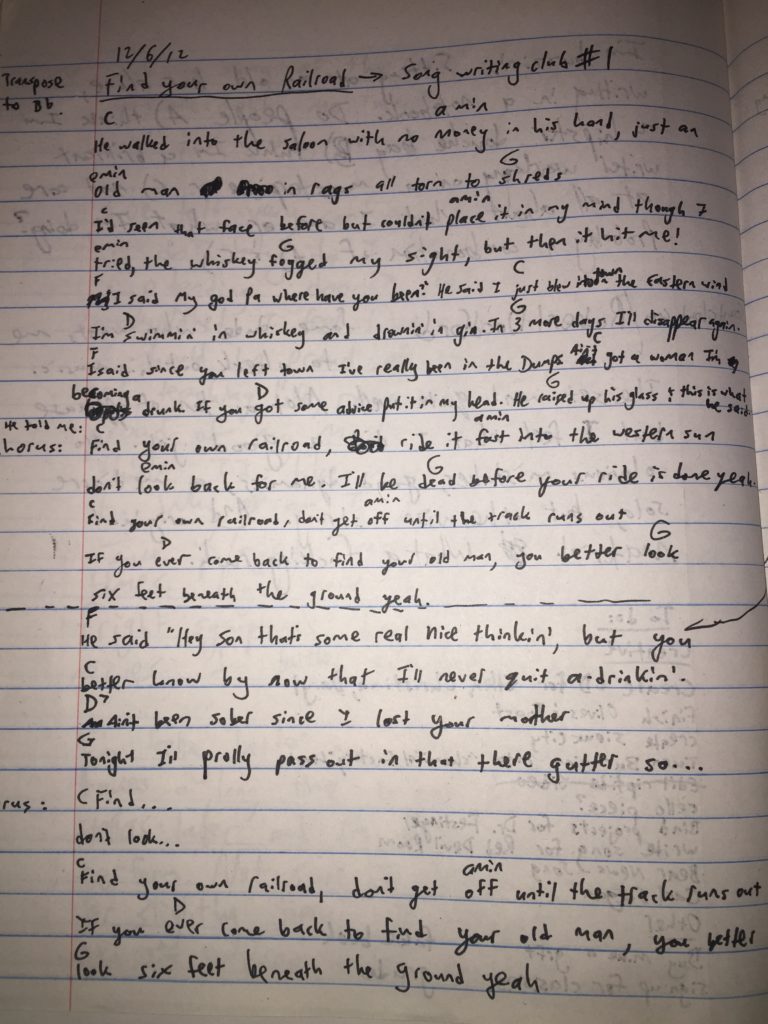
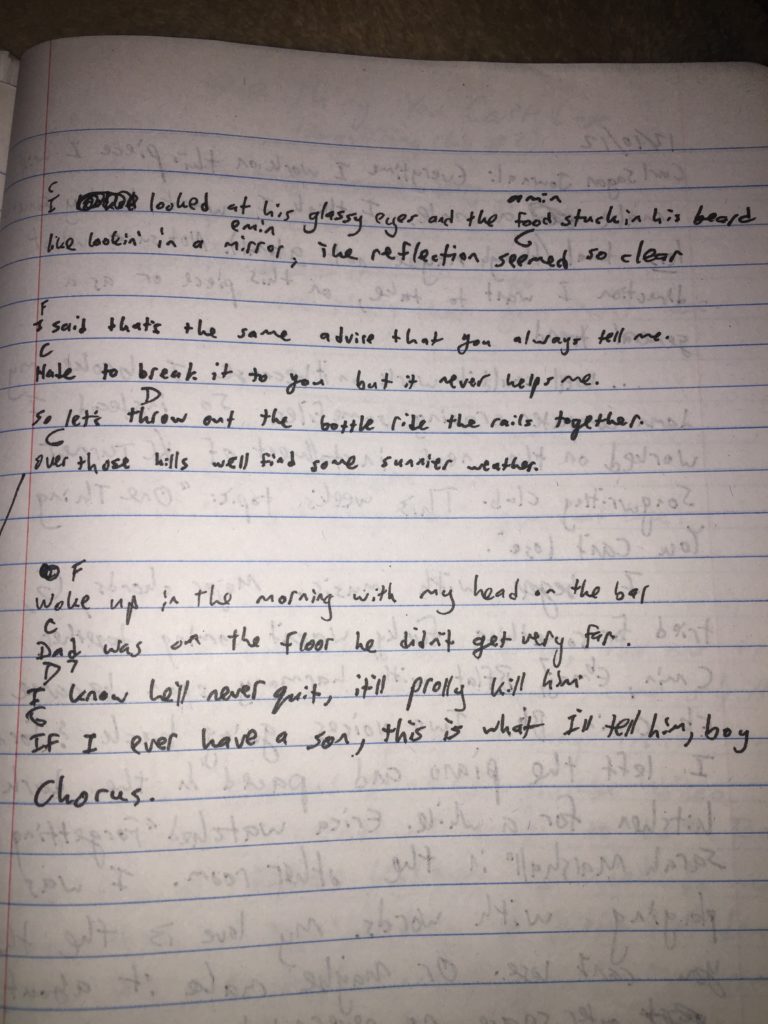
At the end of that first week, a TON of local songwriters had posted new work on the page, each with the same title. What a unique opportunity to listen to so many composers tackle the same theme. Everyone’s work was special in their own way. Some were blues, some country, some spoken-word, some undefinable. I left encouraging comments on various performers’ posts, and they did the same for me. I wanted to stay a respected part of this community for as long as possible, but the only way to keep that going was to write write write!
The next week’s title was “One Thing You Can’t Lose”. My first thought was to do a love song, something like “my love is the one thing you can’t lose”. I tinkered with a bluesy vibe, but didn’t love it. This is where a challenge like this can fall apart. You lose your confidence and that’s it, that’s the end. But this also happened to be the week of my ten year anniversary with my muse and life partner, Erica. I think her muse powers were off the charts that week, because this strange little love song just seemed to emerge from nowhere.
The song is about love aaaand also about the Titanic. Love is the ocean, and there’s no keeping it out. We sink into the black, deeper, deeper, into oblivion. We let it swallow us. We burn with a red heat that even the empty nothingness of the ocean depths can’t extinguish.
That song is called “Here Comes the Flood”. The lyrics really captured how I was feeling that month. It was such a mixture of dark and chilling with excited for life and full of love. In the previous months I had had a major falling out with an old friend and had not yet recovered from that sad episode. Yet celebrating a decade with the woman I love, and coming up on our first New Year’s as a married couple, I had much to be grateful for. I was swept up in love, but also questioning myself, my life, my purpose. Luckily I was able to harness some of this energy into a creative outlet.
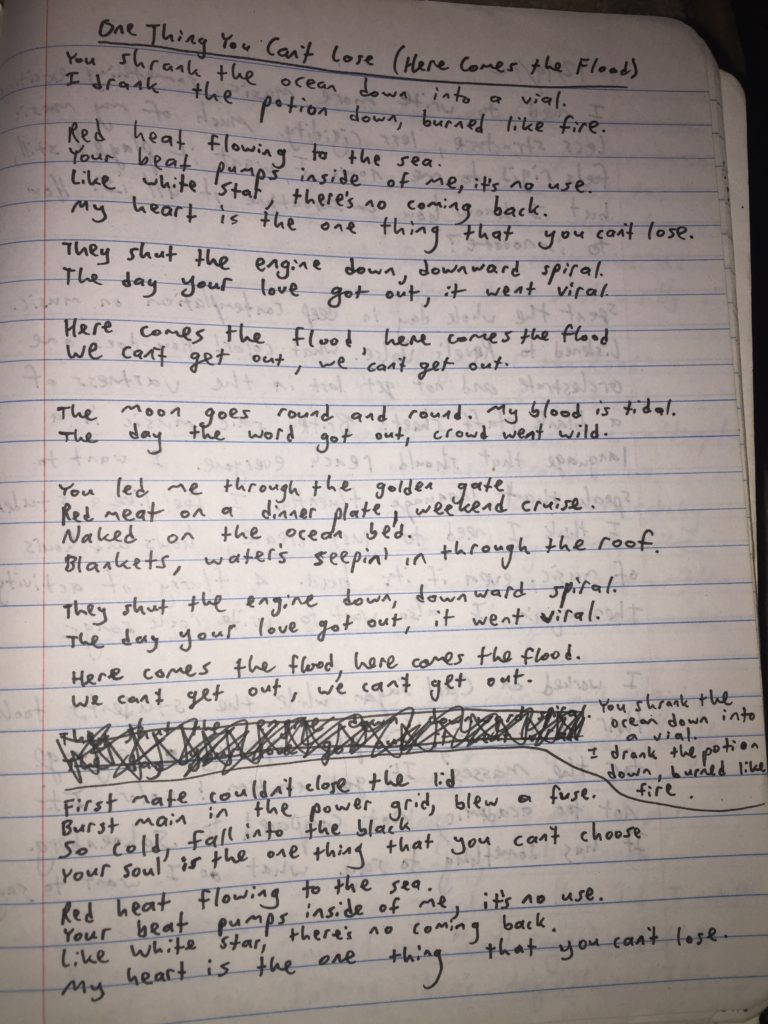
I am thoroughly sold on the Songwriting Club method of art creation, especially for any artist struggling to find inspiration. Adding boundaries and restrictions can be a surprisingly effective way to force an artistic brain to create. When our options are limitless, sometimes our brain will languish in indecision and self-criticism. No idea is profound enough to satisfy the mind. Should I write a love song or a techno song or a classical piece? How can I say something that’s never been said (impossible)? Where do I even begin when I have no idea what the final product should look like? These questions equal paralysis for the artist, who will probably just walk away from his pile of half-finished work and go watch Game of Thrones, wallowing in self-pity, crying out for a bolt of inspiration.
That bolt rarely comes. The reality of songwriting is the reality of all things of quality: they take time, hard work, and patience to do properly. If an artist gets trapped in this negative feedback loop (“I suck at music, so I won’t bother finishing anything. Because I can’t finish anything, I suck at music”), the artist does not progress. Add a boundary or two, and suddenly the artist can eliminate many of those questions that dog him when he wishes to begin a new project, and focus all of his creative abilities on solving a much more narrow artistic puzzle. If the musician knows he has six days to write a song based on a title he didn’t choose, he can get to work without asking if what he is doing is “avant-garde” enough, or what genre his music falls under. Just shut up and write. And if this week’s project isn’t perfect, who cares! You finished something. Now do another.
The next week we had to travel to San Diego to visit Erica’s parents during Christmas. Time for a road trip! Would we be able to continue our song writing streak? We would have to write this entry while on the road, with nothing but my trusty melodica to assist us. Would it be possible? When faced with a creative challenge (and a deadline), the answer I’ve always found is just sit down and work at it. Brainstorm and create drafts and play stuff over and over until you isolate something of quality, then exploit that little nugget for everything it’s worth. Just don’t give up. Harness the anxiety that comes with a deadline, and turn it into creative energy. We prepared to set out on the road.
It was at this moment that the songwriting gods blessed us with good fortune. This week’s title was going to be “Rhythm of the Road”. Forced to write a song about the road whilst on the road… is there anything better than that scenario? The sounds of the road weaved themselves into the fabric of the song. It was inescapable: this song would completely embody the spirit of the title, no matter what the final product sounded like. Whatever we created we would be true to the theme!
It also helped that I got to tap into the mystical power of the melodica. This particular melodica was very special to me, because I had purchased it in Venice, while on my honeymoon four months earlier. To this day, I really don’t feel comfortable playing this song on any instrument except the melodica.
Driving from San Francisco to San Diego gave us lots of time try different drafts, practice harmony, and finesse the song until we were in love with it. The final version is one my favorite things I’ve ever created, though to be honest I really can’t take much credit for this song. Erica created the melody and wrote most of the lyrics. It’s a song about this time we found ourselves drinking and telling stories at a sleezy little campground in Cody, Wyoming, far far from home, lost in a never-ending road trip across the vastness of the American West. This song was really Erica’s baby. I contributed the chorus and basically just sewed the nuggets she had already created into a coherent piece. This is truly a song written by Adventure Cat.
Now we were on a roll. Three weeks, three songs. We were flying high and ready for anything! The next title was “Mailbox Blues”. This one needed something new: Evan. We invited our trustworthy travel companion and fellow Adventure Cat to help us compose this week’s song. We sat down in his apartment and started cranking out ideas. The ideas flowed together into this little gem:
I don’t know who created which part. I don’t care. This song makes me happy, and very nostalgic. I also love Evan’s little solo in the video. We wrote the whole thing in one night. What a fun time that was.
The next week I got robbed. On a cold, clear night right before New Year’s, somebody smashed my car window and grabbed the first thing he saw. I didn’t have much of value in my car, only my melodica from Venice, which the thief dutifully stole. When he realized it was just a cheap, plastic instrument, I imagine he left it on a bus stop bench and ran off to find a more profitable mark. I never found her, but the melodica’s magic lives on in my heart, and in the songs she helped usher into the world.
It was the last memorable event of 2012, a rough way to end. That week’s title was “Last Day of the Year.” I condensed all of my sadness and fear and bewilderment into a little seed, and let it blossom into a song:
This song I wrote alone. I wrote it quickly. It poured out.
We had celebrated New Year’s Eve at a party full of people we did not know, at an enormous mansion deep in the Santa Cruz Mountains. Winding roads, shots of tequila, strange faces, the brisk mountain air, the smell of the ocean in the forest… all of it found it’s way into this piece. I wanted time to freeze, for the world to stop. I felt like I was slowly sinking into the Earth.
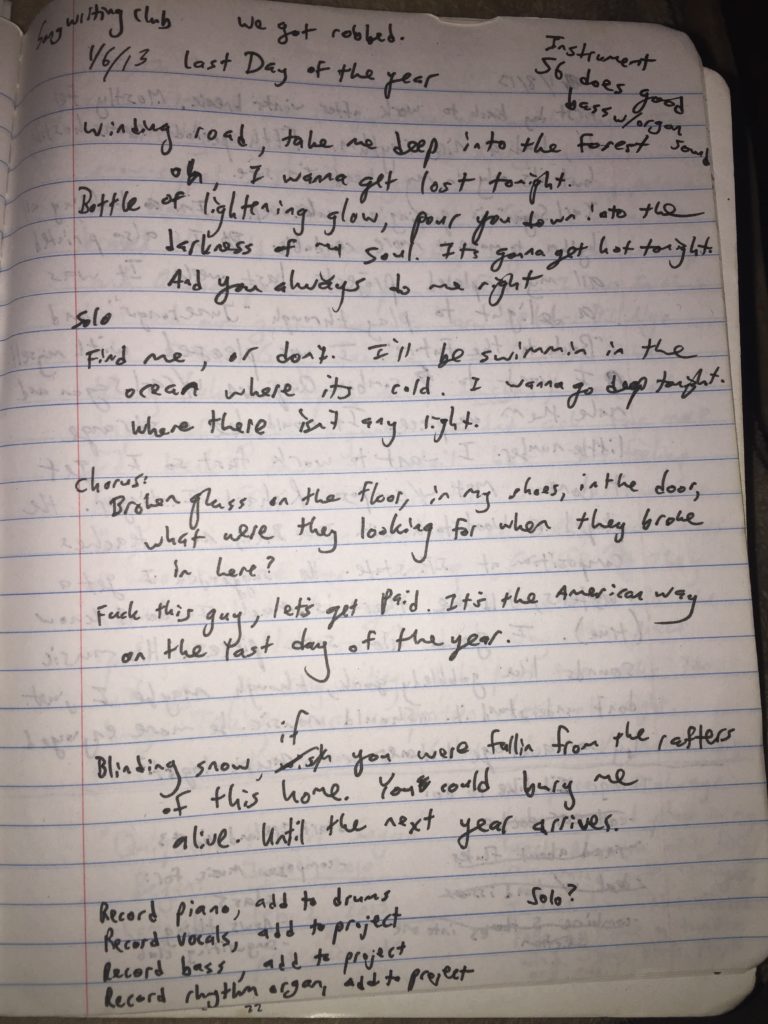
Though I did enjoy trying my hand at low-tech sound engineering, “Last Day of the Year” ended up with a lot of pops and clipping. I wanted to experiment with recording more layers, but one week was no longer enough time, especially once I went back to work. I wanted to really do something fancy for the next piece. So when I learned the next title, I relaxed my one week deadline and took my time with it.
The next title was “Tiny Wings”. Actually, as I write this, I’m not entirely sure that was a title in the songwriting challenge. I might have made it up… Either way it took me about three months to put this together, chipping away slowly night by night:
I was thinking about my mom and how she must view me, what it must be like to see your child grow into an adult before your eyes. I didn’t have a child at this time, so I couldn’t truly understand it, not yet, but this was my attempt at it. Now that I’m a parent myself, I understand it so much better. I think writing this helped me wrap my head around parenting for the first time in my life.
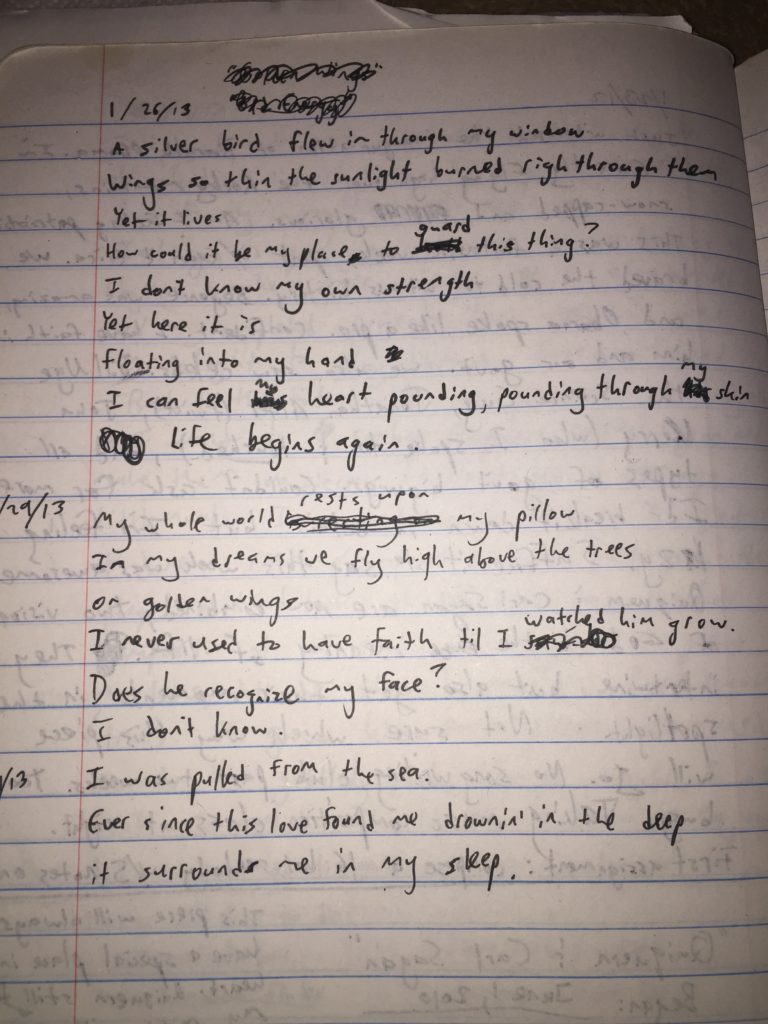
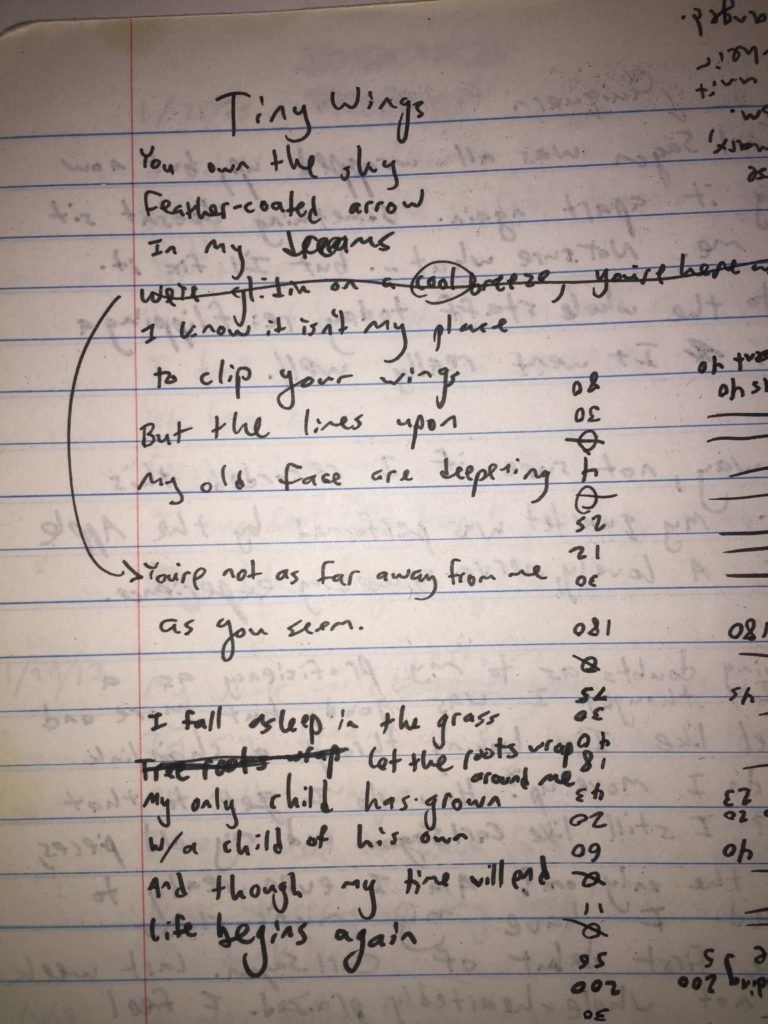
As far as sound engineering goes, I really didn’t know what I was doing. Just a lot of trial and error. The whole thing was made with a Casio keyboard and Finale notation software. This was a HUGE learning experience.
By this point I had missed a bunch of weeks, so I had a lot of titles I could choose from for the next song. One that stood out to me was “Somebody’s Lie”. I decided to make it “Everybody’s Lie”. This is probably the most nihilistic piece I’ve ever written, but I don’t think it takes itself too seriously. In fact, the whole point of it is how humanity takes itself far too seriously and deserves a bit of mockery for that. In that vein, I created a music video to go with it:
And yes I understand the irony (or perhaps hypocrisy) of an artist spending hours and days crafting a meaningful art piece about how nothing really matters. But I’m only human… The beat is by David Neawedde, the guitar licks are Evan Owen. Everything else is Cassio keyboard.
I wrote some other rock songs during this period, but only one more really counts as Songwriting Club material. I went to the site one final time and selected the title “10,000 Hours”:
This song finally allowed me to express some of the anger I had been holding onto after that falling out months and months earlier. Sometimes it takes awhile for these things to work their way to the surface, but when they do they always emerge as a kind of muse. This process of creation through pain allows me to heal. After writing this, I really did feel better about the whole situation.
I also call this song the hypocrite song, because the speaker could be speaking from my point of view, or my ex-friend’s point of view. Since we both acted so terribly during the falling out, neither is blameless. I am guilty of every crime I accuse him for. And yes, that’s Evan on the guitar again, killin’ it.
After this song I fell away from the Songwriting Club for good. I still wrote new stuff when the feeling took me, but never at the same speed as during those late weeks of 2012. The artistic stars aligned for me during that brief period, everything worked. The new material not only allowed me to flex my creative abilities to their limits, but also to bond with my loved ones through the creation of art. And that is a rare and cherished thing.
By the way, if you want to work on your song-writing chops, find yourself a songwriting club. Or just grab a title out of the newspaper, or a billboard, or the babblings of a toddler. It’s your songwriting club, so do it however you like! The only rule is you have to finish whatever you start. You must not put the project down until it is done. And if you run out of time or patience, and you are forced to call it finished even though it isn’t a brilliant, earth-shattering masterpiece, good. You still finished a piece! Well done, seriously. You are creating art. Now do another one, and another. Some will be winners, some won’t quite ever feel right no matter how many times you tinker with it. But you are practicing, honing your craft. Every finished work gives you experience points. So good luck, and happy writing!

